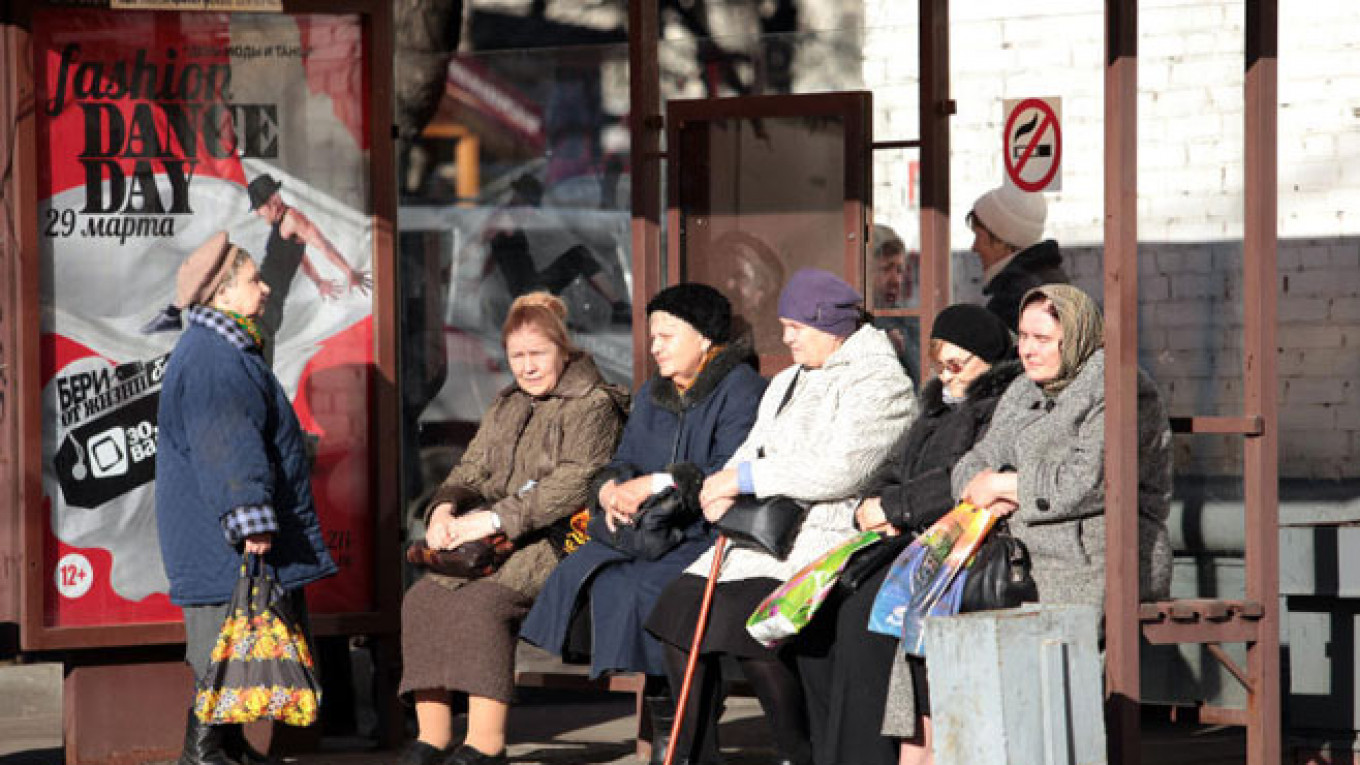Top economic officials made an impassioned plea Thursday to preserve the payments employees make to privately managed pension funds as a government battle rages over pension reform.
Russia has steadily rolled back 2002 pension reforms and so-called liberals within the government are now fighting a rear-guard action to save the remnants of the system that is supposed to provide a key pool of investment capital.
"A mandatory pension accumulation system is of critical significance to ensure that the country has a capital market and long money," Central Bank head Elvira Nabiullina told the Moscow Exchange Forum.
With the Russian economy predicted to contract by up to 5 percent this year, concern is rising that a lack of long-term investment — like that provided by pension funds — will severely reduce the growth potential of the Russian economy and reduce the stability of financial markets.
Investment from pension funds could go some way toward alleviating this, but funded contributions — known as the accumulated part — have been redirected to government spending for two years. Under proposals supported by the Labor Ministry, the funded contributions now face annulment.
A decision on the issue was expected at a Cabinet meeting last month but was reportedly kicked down the line. Deputy Prime Minister Igor Shuvalov told journalists Thursday that a resolution would be found "soon."
Nabiullina's position in favor of keeping the contributions to individual retirement accounts was publicly supported Thursday by both Shuvalov and the head of state-owned banking giant Sberbank, German Gref.
"It is essential not to cancel or undermine this system," said Gref, a former economic development minister, who went on to paint a grim picture of what it would be like if Russia reverted to a pay-as-you-go pension system.
"Particularly with the radical reduction of the amount of workers relative to the amount of pensioners in the country we will run into huge, long-term macroeconomic problems," Gref told investors and bankers at the conference.
Under the current system, pension payroll contributions by employers are split into two parts. One part (equivalent to 16 percent of a salary) goes straight to paying current pensions while the other (equivalent to 6 percent of a salary) goes to individual pension funds.
In a gradual rollback of the 2002 system, pension fund contributions were made voluntary for employees in 2013 and have been used to bankroll budget spending for two years.
A poll of economists by news agency Bloomberg earlier this week indicated that a majority expected the government to freeze the contributions for another year.
Proponents of a pure pay-as-you-go system argue that all pension contributions should go toward financing current pensioners, with each new generation bankrolling the last.
Russia's State Pension Fund runs an annual deficit of trillions of rubles covered by direct budget transfers. The government plans to channel about 3 trillion rubles ($52.9 billion) to the pension fund this year after providing 2.4 trillion rubles ($42.3 billion) in 2014, according to official data cited by Bloomberg.
Former Finance Minister Alexei Kudrin, who was a key figure in introducing funded contributions in 2002, has compared Russia's pension system to a "classic financial pyramid" and said that the scrapping of funded contributions could pave the way for expropriation of money that has already been invested.
The increasingly desperate defense of the funded part of pension contributions by some economists and officials comes amid warnings that international tensions over Ukraine, a shrinking economy and political risks — compounded by corruption and a flawed legal system — will choke off investment in Russia for the foreseeable future.
"The key question for the economy, for the creation of sustainable growth, is investment," Nabiullina said Thursday.
Investment has been hit in recent months by high interest rates, but the World Bank warned in a report this week that structural factors could mean a lack of investment could persist for many years, lowering long-term economic growth prospects.
Few officials or bankers try to hide that most investment will likely have to come from domestic capital because foreign money has been driven away by low oil prices and Western sanctions on Moscow over Ukraine.
"The trend with foreign investors is clear: there are none," chairman of Otkritie Financial Corporation Ruben Aganbegyan said Thursday.
A Message from The Moscow Times:
Dear readers,
We are facing unprecedented challenges. Russia's Prosecutor General's Office has designated The Moscow Times as an "undesirable" organization, criminalizing our work and putting our staff at risk of prosecution. This follows our earlier unjust labeling as a "foreign agent."
These actions are direct attempts to silence independent journalism in Russia. The authorities claim our work "discredits the decisions of the Russian leadership." We see things differently: we strive to provide accurate, unbiased reporting on Russia.
We, the journalists of The Moscow Times, refuse to be silenced. But to continue our work, we need your help.
Your support, no matter how small, makes a world of difference. If you can, please support us monthly starting from just $2. It's quick to set up, and every contribution makes a significant impact.
By supporting The Moscow Times, you're defending open, independent journalism in the face of repression. Thank you for standing with us.
Remind me later.







